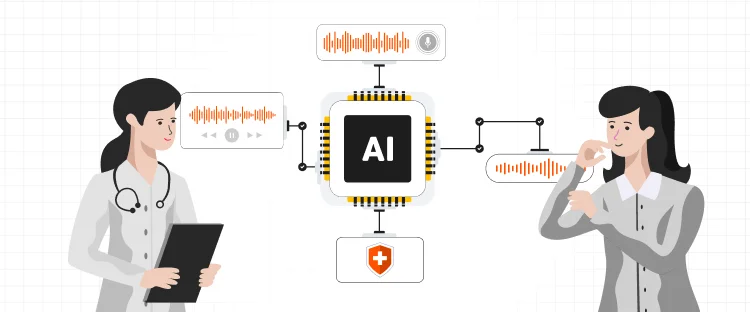According to ComScore, by 2023, half of all searches will be via voice. Many other corroborating sources state that voice searches will likely be above 45% and closer to 50 by the next two and a half years.
So how in the world is this even possible? How could technology that we know so little about already be getting so much mainstream attention?
Well, the first reason is that the voice has extremely low friction. Talking to your phone just seems natural, right? We all like to have conversations. And when our phones or devices talk back to us, it's something we can relate to. We don't have to learn some fancy new syntax. We're not learning to code. We're simply having a conversation. And that's something that anyone from any age group can get behind.
And better yet, the technology is already built into our phones. We already have the hardware to make voice technology work. Every phone has a microphone. Every phone has a screen, and they're all built to give and receive information. And that's why the install numbers have been staggering.
So this is according to every one of these brands and not necessarily confirmed by outside sources. But regardless, the numbers are staggering.
Now, Amazon Alexa claims 20 million device installs. These numbers are from Jeff Bezos in 2017. Analysts claim that those numbers have at least doubled. And with Alexa getting so much mainstream support from third-party brands. You can anticipate that the install base is going to continue to grow at an incredible rate.
Two of the players that we don't consider leaders right now have massive installed bases. Siri, the first real voice assistant launched by Apple a few years ago is on over 500 million devices. From the home pods to the iPhones to the iPad and every device in between. Apple makes sure to continuously plug Siri into all of its hardware.
Cortana
And Microsoft has done the same with Cortana with over 400 million installs across things like Windows Phone, Windows 10x, Xbox, and a variety of other products. So as you can see, we've already laid the foundation for a massive eruption in the voice assistant and voice search industry, and on top of that consumer-adoption is high.
Let's look at dedicated smart speakers. According to NPR, we've seen 16% of all US households purchase a dedicated smart speaker device, and believe it or not, this outpaces the adoption rate of mobile phones and tablets. So not even speaking about the built-in install base on all of our phones. People want these dedicated smart speakers and Smart Objects and are buying them at an alarmingly high rate.
The first thing we have to consider is that consumer search behavior is very much likely to change and we're already seeing some signs that people aren't using Voice Search the same way that you screen search. They use more natural language.
Hence, we will have to keep in mind that the same search behavior that worked in the past might not be replicated when the voice goes mainstream.
Voice Search is now one of the most popular ways to get information quickly. One in two smartphone users now uses voice technology daily. 72% of people who own a voice-activated speaker on their devices often use it as part of their daily routine.
Why is Voice Search Growing So Quickly?
Well, a lot is driving this trend.
The way we speak, the digital assistants use voice search keywords that are more conversational than type keywords. This matters for Voice Search optimizations because it affects what you use in the on-page optimization.
For Instance, you might normally type a “pumpkin pie recipe”, but with a voice search period, you'd be more likely to say, “ how do I make pumpkin pie?
This is all part of the Google Hummingbird update. Hummingbird will become an insert engine. You can get tons of relevant search results right in Google without typing on an actual website.
Hummingbird emphasizes semantic search, conversational keywords, and implied query. This is described as the intent behind those search terms. Hummingbird matches context and intent, i.e., the needs of the user to sit at the foundation for Voice Search.
Ultimately, Google wants to know the user's path behind searches, but it's hard for machines to recognize them. Sometimes they're divided into four main categories: informational, navigational, actionable, and transactional.
Example You might search for who Joe Biden is? Now if you ask a follow-up question, “where is he from?”
Google will understand the implied meaning of Joe Biden. Because of your first search, Google knows who you were talking about. Each question is relevant to the first one. Rather than each search being treated as a blank slate.
Google uses geolocation data to provide an answer to the search. The same search with Siri will yield different results from Apple's maps app, which uses data from multiple companies including Yelp and Foursquare.
While Siri and Google use different geographic databases when it comes to regular search results. They both use Google. The bottom line here is that people use voice search when they want a quick answer. This is why content that's optimized for Voice Search needs to give people direct answers to their specific questions.
When it comes to voice search, people aren't necessarily looking for instructions on complex tasks rather they are usually looking for micro depth. So how do you optimize your SEO and content for Voice Search?
Well, here are a couple of things. Number one, find voice search keywords.
The keywords you should prioritize should target natural language keywords. These natural language keywords are longer search terms that are usually five words or longer. They're usually questions. For example, you might type natural language keywords definition but you would say what are natural language keywords?
Even question keywords might be different for voice. You might type, “how to do link building?”, while a voice search might be ``how do I build more links to my website?”
When you type in the search box, you can use third-party tools like answer the public.com or Uber to suggest a mind for questions keywords that people are saying. It's also a good idea to buy a call center live chat or email data.
Here's how to do it.
Your focus for Voice Search Optimization should center around them. Get those keywords into your content, optimize your pages as you normally would, and include as many queries that sound like voice terms, on the next embed long-tail keywords into your content.
Make sure to optimize your long-form content for voice when creating long-form content. Embed as many answers as you can into it. Longer pages with more long-tail keywords on that might have a better chance to rank.
Why? Well, lower content simply plays the numbers game of having more keywords on the page. Just work that naturally into your writing. Don't make them seem stuck with awkward-sounding phrases, and optimize short-form content for voice search as well.
You can also make sure content is highly targeted towards voice search keywords. Try the technique of making voice search-based FAQ pages. Structure the content as a series of question keywords, and include more non-question long-tail keywords in the answers.
As mentioned already, voice searches tend to sound more natural and less robotic than keyboard input. In Search, queries, write your content the same way to possibilities for capturing local customers with Voice Search Optimization.
Voice Search is a huge trend that will only keep growing as more people use devices to seek out information.

Colorado is said to be one of the best places to do business because the business environment is very friendly
Read More
The global marketplace has become an attractive place for brands and businesses, where they strive to create a presence of
Read More
CAD, or computer-aided design and drafting (CADD), is the use of computer technology for design and design documentation. CAD software
Read More
Many global companies, foreign governments and Iranian are hoping to see an increase in investment in Iran after declaring the
Read More
Artificial intelligence has taken a big space in almost every industry. There is also a widespread acceptance that AI is
Read More
Persuasion is all about manipulating other people behavior. At first it might sound immoral but it doesn’t have to be.
Read More
Now days everyone is searching for good ideas for their company they wanted to be more creative, they wanted to
Read More
Technology has now much diverse roots in this age of development. Now it is not wrong to say, that you
Read More
Localization is the practice of altering the functional properties of a product and also its characteristics. This is easily done
Read More


Document Translation
Professional document translation by native expertsApp Localization
Get more downloads by adapting your app for different target marketsVideo Translation
Multilingual translation and subtitling servicesWebsite Localization
Adapt your website into multiple contexts for global reachSoftware Localization
Adapt your software for global usersGame Localization
Reach new players with localized gameplayMTPE
Refine AI translations for natural fluencyBusiness Translation
Professional translation for business documents and websitesDTP & File Conversion
Professional DTP and File conversion, supporting multiple file formatsProofreading
Perfect your content with expert review© Copyright 2025 MarsTranslation